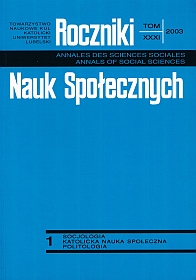Ruch Focolari wobec współczesnego kryzysu tożsamości
Abstrakt
The Focolari movement – one of the largest, dynamically developed, international, Catholic movements of revitalization – was in the period of years (1995-2000) the subject matter of research. The research made use of a number of qualitative methods. Thus the process of creating a collective identity was reconstructed. Moreover, the organizational actions were shown as regards the presentation and promotion of the specific appeal to convert, and its related patterns of involvement and social identities.
The Focolari movement was established as a result of individual quest after an alternative form of religious commitment within the Catholic Church. This individual quest was then transformed into a collective quest. The process of initial conversion of a fellowship had brought about foundations for the collective identity and a common mission of the movement. Under the leadership of a charismatic leader it was developed and referred to the post-conciliar reforms of Catholicism and the problems of modern societies. By virtue of an effective organization, with the use of modern means of communication, the movement extends its appeal for a multicultural, interfaith, world-view dialogue, and cooperation in the private and public spheres. It disseminates also alternative patterns of religious and lay social identities, which supplement of the offer of conventional religious and lay institutions.
Bibliografia
Abignente L.: GEN – „nowe pokolenie” Ruchu Focolari, „Nowe Miasto” 1(1994), nr 2, s. 9-13.
A. C.: Mariapoli '92. Ku przyszłości pełnej nadziei, „Mariapoli” 1(1992), nr 8, s.10-11.
Araujo V.: Economy of Communion, „Journal of Mental Changes”, 2(1996), No 1, s. 37-45.
Aubert R.: Półwiecze, które przygotowało Sobór Watykański II, w: Historia Kościoła, t. 5, red. L. Rogier, R. Aubert, M. Knowles, Warszawa: PAX 1985, s.397-472.
Bateson D., Ventis L.: The Religious Experience. A Social-Psychological Perspective, New York: Oxford University Press 1982.
Berger P.: Tożsamość jako problem socjologii wiedzy, w: Problemy socjologii wiedzy, red. A. Chmielecki, Warszawa: PWN 1985, s. 476-493.
Cohen J. L.: Strategy or Identity: New Theoretical Paradigms and Contemporary Social Movements, „Social Research” 52(1985), No 4, s. 663-716.
Dal R i C., Martelli G.: Powołanie wolontariusza (mps powielany).
Dekret o działalności misyjnej Kościoła „Ad Gentes Divinitus” nr 22, w: Sobór Watykański II. Konstytucje, dekrety, deklaracje, Paris: Èditions du Dialogue 1967, s. 421-481.
Eyerman R., Jamison A.: Social Movements. A Cognitive Approach, University Park, PA: The Pennsylvania State University Press 1991.
Gallagher J.: A Woman's Work: Chiara Lubich. A Biography of the Focolare Movement and its Founder, Hyde Park, NY: New City Press 1997.
Grzymała-Moszczyńska H.: Rola i miejsce doświadczeń mistycznych w strukturze światopoglądu młodzieży akademickiej, „Nomos” 2(1993), nr3-4, s. 93-103.
Hagemann W.: Klaus Hemmerle – biskup według Serca Bożego, „Nowe Miasto” 1(1994), nr 3, s. 11-14.
Halbwachs M.: Społeczne ramy pamięci, Warszawa: PWN 1969.
Hałas E.: Konwersja. Perspektywa socjologiczna, Lublin: Norbertinum 1992.
Hardin B., Kehrer G.: Identity and Commitment, w: Identity and Religion, Ed. H. Mol, London: Sage 1978, s. 83-96.
Hewitt J. P., Hall P. M.: Social Problems, Problematic Situations and Quasi-Theories, „American Sociological Review” 38(1973), s. 367-374.
Historia wolontariuszy (mps powielany).
Jawłowska A.: Drogi kontrkultury, Warszawa: PIW 1975.
Kamykowski Ł.: Kapłani i Ruch Focolari, „Nowe Miasto” 2(1995), nr 1, s. 14-15.
Klapp O.: Collective Search for Identity, New York: Holt, Rinehart and Winston 1969.
Kozielecki J.: Transgresja i kultura, Warszawa: Żak 1997.
Lofland J., Stark R.: Becoming a World Saver. A Theory of Conversion to a Deviant Perspective, „American Sociologiacal Review” 30(1965), nr 6, s.862-875.
Lubich Ch.: Klucz do jedności, Katowice: Księgarnia św. Jacka 1989.
Lubich Ch.: Przemówienie na spotkaniu wyższych przełożonych zakonów męskich, Grottaferrata 27. 05. 1987, w: Ruch Focolari, oprac. E. Spolińska, Kraków 1991, s. 3-16.
Lubich Ch.: Bóg-Miłość. Duchowość wspólnotowa, „Mariapoli” 2(1993), nr5-6, s. 18-19.
Lubich Ch.: Przygoda jedności. Z założycielką Ruchu Focolari rozmawia Franka Zambonini, Kraków: WAM 1995.
Melchior M.: Kategoria tożsamości jako wyzwanie badawcze, w: Kulturowy wymiar przemian społecznych, red. A. Jawłowska, M. Kempny, E. Tarkowska, Warszawa: IFiS PAN 1993, s. 229-245.
Robertson E.: Chiara, Ireland: Christian Journals Limited 1978, s. 52-60.
Ruggiu C.: Otwartość i komunia. Siostry zakonne dziś, „Nowe Miasto” 3(1996), nr 5, s. 12-15.
Shils E.: Charisma, Order and Status, „American Sociological Review” 30(1965), No 2, s. 199-213.
Spolińska E.: Mariapoli '93. Letnie rekolekcje Ruchu Focolari, „Mariapoli” 2(1993), nr 9-10, s. 6-11.
Strauss A.: Mirror and Masks the Search for Identity. San Francisco: The Sociology Press 1969.
Strzeszewski Cz.: Katolicka nauka społeczna, Warszawa: ODiSS 1985, s.260-265.
Vlk M.: Czas dojrzewania. Detlinde Assmus rozmawia z arcybiskupem Pragi, Warszawa: Verbinum 1995.
Wach J.: Socjologia religii, Warszawa: Książka i Wiedza 1961.
Copyright (c) 2003 Roczniki Nauk Społecznych

Utwór dostępny jest na licencji Creative Commons Uznanie autorstwa – Użycie niekomercyjne – Bez utworów zależnych 4.0 Międzynarodowe.


